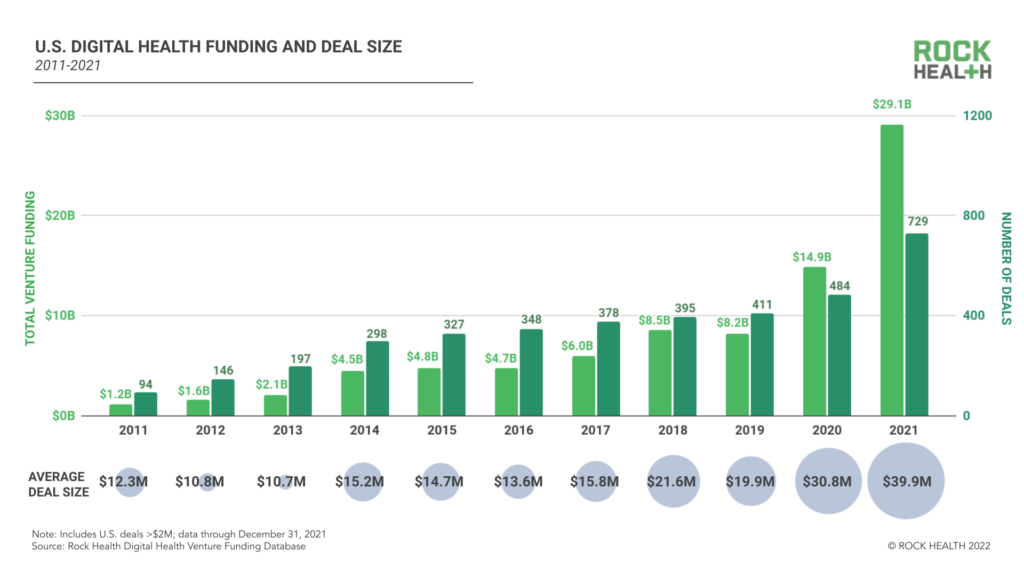Key Takeaways
- A strong employer brand is vital for attracting the most talented people in healthcare.
- The recruitment process should be user friendly, fast, and highly streamlined.
- Focus on building and communicating a strong Employee Value Proposition (EVP)
Today, healthcare has expanded into a consortium of industries, including telemedicine, healthcare analytics, femtech, and several others.
Healthcare companies require a solid workforce to execute their large-scale business operations. Hence, recruiting for healthcare firms is a crucial concern when it comes to reducing costs and maintaining a steady pipeline of highly qualified employees.
The above-mentioned health industries are snowballing, and one of the fastest-growing technologies in healthcare is Artificial Intelligence. A report by Precedence Research points out that AI in the healthcare market size will grow to more than 180 billion dollars by 2030. In addition, the funding received by healthcare startups is increasing each year, as seen in the graph below.

Source: Rock Health
Top Strategies To Follow When Recruiting For Healthcare Companies
Healthcare startups are growing at breakneck rates, but they need a regular supply of talented individuals to sustain this growth. Moreover, the global healthcare industry is going through a massive staffing crisis as companies and hospitals struggle to hire and retain professionals.
A report by the Bureau of Labor Statistics indicates that more than 270,000 nurses will be required from 2020 to 2030, which is a massive undertaking. The staffing shortage is expected to persist for a few more years, making it more recruitment for healthcare companies more challenging.
Hiring managers are well aware of this problem and are taking drastic measures to cope with it. They finally realize the importance of non-traditional benefits like providing a sound work-life balance to their employees while prioritizing their mental health.
Ted Jeanloz, the CEO of connectRN, a healthtech startup focusing on nursing, had this to say about the challenges in recruitment for healthcare firms:
“The first step to addressing staffing shortages is to listen to nurses and give them the tools they need to be successful in their jobs, which as we’ve seen from the survey, includes measures like allowing them more flexibility, a better work life balance, more time for friends and family, and the ability to take breaks without feeling guilty that their patient care is suffering,”
In addition to Ted’s advice, healthcare businesses can improve their recruitment process by taking a strategic approach. Some of the best tactical measures that HR managers can take while recruitment for healthcare firms are as follows:
1. Boost Your Employer Brand
Many businesses need to be made aware of how crucial employer brand is when recruiting for healthcare organizations. It involves controlling and influencing how potential candidates, workers, and key stakeholders see you as an employer. It entails everything you carry out to market your company as a top employer. Advertising and employer branding are essential for attracting the best healthcare analytics experts.
As was already established, there are numerous subfields within modern healthcare, including telemedicine, digital health, and healthcare analytics. All of them are incredibly technical sectors with a strong emphasis on research and development that are continually changing. As a result, candidates choose to work for healthcare organizations with a solid reputation for investing in research and high brand value among potential employees.
The latest crop of healthcare professionals wants to take part in the revolution that is currently taking place in the field and actively contribute to its transformation. For instance, it will be much more difficult for a business to recruit top healthcare expertise if it has a bad reputation for offering a harsh work environment and inadequate perks.
Healthcare organizations may improve their employer brands by building a company blog, maintaining a solid social media presence, and encouraging current workers to serve as brand ambassadors.
2. Develop And Communicate A Strong Employee Value Proposition
The Employee Value Proposition (EVP) is a collection of affiliations and services that an organization offers in exchange for the knowledge, abilities, and experiences an employee contributes to the business. It also includes how firms recruit potential employees and keep them on board in a cutthroat employment market.
Building a robust Employee Value Proposition is necessary while recruiting for healthcare organizations that want the most talented people. In addition to improving the recruitment of active candidates, communicating a compelling EVP that aligns with peoples’ aims and desires can also assist your company in attracting passive prospects, and broadening your applicant pool.
The most notable aspects of an organization’s EVP include the following:
- Values and company culture, as well as how employees, executives, and cooperation foster that culture
- Possibilities for growth and advancement
- Possibilities for empowerment and job satisfaction
- Feelings of success and significant job contribution Confidence in leaders and their outlook for the organization’s future
3. Make Use Of Niche Job Boards
Well-known job boards like Indeed, Linkedin, and Glassdoor are used by businesses to post job openings. There is a significant disadvantage to hiring from these platforms, although they are unquestionably effective and will draw hundreds of brilliant people. Sorting through hundreds of applications will be a difficult chore because the majority of them won’t meet the requirements
Therefore, healthcare organizations should adopt a more specialized and focused strategy to find top healthcare professionals. They can achieve this by posting jobs on specialized job boards and portals that cater to the healthcare sector. One platform that helps healthcare organizations locate the top applicants for the most technically demanding positions in the industry is Benchpoint.
Health Career Center, Medicaljobs.org, Hospital Careers, and Healthcare Source are other renowned job portals that cater to the healthcare industry.
4. Consider Investing In Recruiting Software For Higher Efficiency
Recruiting software can help firms streamline every hiring process, from attracting candidates to distributing offer letters. Despite their differences, the terms applicant tracking systems (ATS) and recruiting software are sometimes used interchangeably. Modern hiring tools are used by multinational corporations, saving the hiring manager a ton of time and resources.
According to Capterra’s research, almost 75% of businesses utilize Application Tracking Software (ATS) or recruitment to streamline the hiring process. Companies must create modern, straightforward hiring and onboarding procedures that give candidates a sense of worth. In the event that a candidate is rejected, you won’t damage their opinion of the company.
Besides, ATS healthcare companies can take additional steps to further smoothen the process. Examining the discrepancies between what an organization thinks it does well and what candidates expect can be done with the use of candidate experience surveys. The following are crucial elements of a successful hiring and recruitment process:
- A Speedy, user-friendly application process.
- Clear communication about job requirements.
- Transparent disclosure of total compensation and EVP.
- Recruiters who are responsive and who are clear about what will happen next.
5. Assess Hard and Soft Skills
Today’s healthcare jobs are not limited to the medical domain, as technology is heavily involved. Hence, modern healthcare employees must be technically trained and competent in multiple fields to excel in a highly competitive environment. They should have a portfolio of proven hard skills directly related to their field.
For example, a healthcare analyst must have the expertise and knowledge of computer engineering, programming languages, database management, data analysis, and also a solid medical understanding. That is why companies should prioritize assessing their potential employees’ technical capabilities through rigorous testing and using structured interviews whenever possible.
Besides hard technical skills, medical and healthcare professionals should also have soft skills like teamwork, time management, interpersonal skills, and strong attention to detail.
If you’re keen to find out more about the best practices while recruiting for healthcare companies, get in touch with BenchPoint, our healthtech recruitment agency. We’ll show you how to maintain an ongoing hiring pipeline so qualified candidates are always only a click away.
We are happy to help you with any inquiries or worries you may have, and we can collaborate with you to create hiring strategies that are more clearly defined and swiftly produce the desired results.
